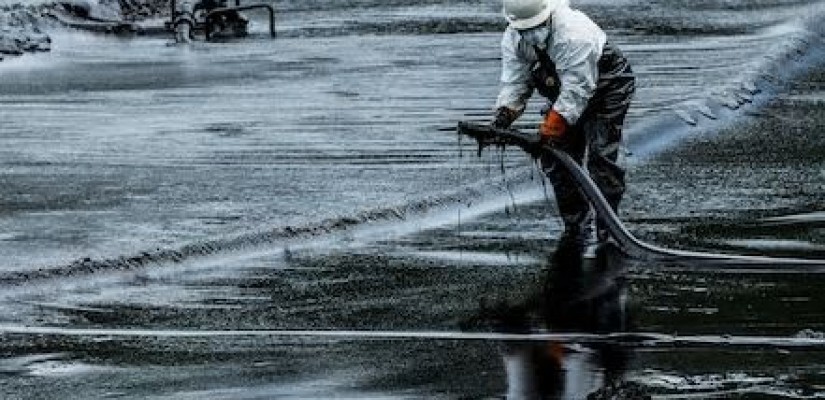An environmental catastrophe following a recent natural oil spill in Indonesia has gained international attention. On July 12, 2019, an underwater drilling well belonging to Pertamina, Indonesia’s state-owned oil company, started leaking, raising great concern about marine pollution and reminding the international community of the fatal oil spill in Borneo in March 2018. This incident has affected not only the people whose livelihoods depend on marine life but also the sustainability of the ecosystem. As the catastrophe continues to unfold in Indonesia, the government and its oil enterprise must establish a comprehensive risk management and prevention mechanism to prevent similar incidents in the future.
Pertamina disclosed that a sudden release of natural gas had triggered the escape of crude oil from its well. The leak has released approximately 3,000 barrels of oil since July 12, 2019. As a result, the spill has polluted 4.5 km2 of seawater, affecting the livelihood of thousands of local inhabitants.
While Pertamina has made a significant effort to plug the underwater leak, the process of post-disaster environmental recovery will be time-consuming, and clean-up operations will be costly. Fixing the leaking well is expected to take around eight weeks, and the clean-up process is estimated to reach completion in March 2020. Pertamina’s post-disaster recovery expenses add up to $10 million and include the deployment of 4.7 kilometers of static oil boom equipment as well as four oil skimmers throughout the Offshore North West Java (ONWJ) Block and ten areas in Karawang. Pertamina also commissioned Boots & Coots, the American company that handled the massive oil spill in the Gulf of Mexico in 2010, to manage the oil spill.

When oil is released into the sea, its toxic chemicals can have long-lasting effects on the marine environment and consequently thousands of fishermen in the area. Pertamina affirmed that it will compensate affected residents and fishermen in the area, including maintenance in affected areas, renovation of public facilities, and environmental rehabilitation. Yet, ecosystems and habitats polluted with natural oil will require a long time to fully recover. The catastrophic oil spill in the Gulf of Mexico, during which five million barrels of oil poured into the ocean, still affects the environment even a decade after the incident. Scientists estimate that 15% to 30% of the spill eventually settled at the bottom of the Gulf of Mexico, harming the aquatic ecosystem.
The state has the responsibility to provide the necessary measures to protect the interest of its people against the consequences of maritime casualties resulting in oil pollution under international law. Article 192 of the United Nations Convention on the Law of the Sea (UNCLOS) specifies that states must protect and preserve the marine environment. Furthermore, UNCLOS article 208 stipulates that states must take necessary measures to prevent, reduce, and control such pollution. As a state-owned enterprise, Pertamina, however, is still lacking the risk management expertise and preparedness to prevent or contain the oil spill. Following a few high-profile incidents leading to major spills at offshore installations in Indonesia, Pertamina must enhance its focus on already existing marine oil spill prevention and preparedness tools.
Pertamina should invest in crucial research on oil spill response with risk assessment and management. Prevention measures are designed to avoid a potential accident, while response operations are aimed at containing the spill and recovering as much oil as possible. For instance, the government of Canada has invested $1.5 billion in the Oceans Protection Plan to facilitate research on oil spill response measures and coastal environmental baseline monitoring. The scientific research program is fundamental to evidence-based decision-making in terms of planning and carrying out marine conservation efforts to protect coasts and waterways from the impact of potential oil spills and to support the collection of data to identify changes in coastal environments. The Indonesian government should therefore consider adopting a similar risk management program in order to identify risks, define roles and responsibilities, and produce performance-based, adaptable, scalable, and sustainable solutions. It is vital to adopt robust response and safety systems which include an allocation of responsibilities, compensation for loss, and an assessment of environmental cost.
As the offshore exploration and production industry moves into more challenging environments in Indonesia, the sector’s risk profile is changing. Warranting additional prevention and preparedness measures will help the Indonesian government maintain the reputation of its oil business and manage potential risks. Operating conditions still present several challenges, including a lack of infrastructure and the successful implementation of effective clean-up techniques. Therefore, the Indonesian government and Pertamina must complement each other’s efforts through the robust regulation of petroleum activities in the region. Minimizing long-term environmental impacts and protecting the region’s population by providing an adequate risk program should be the government’s priority.
